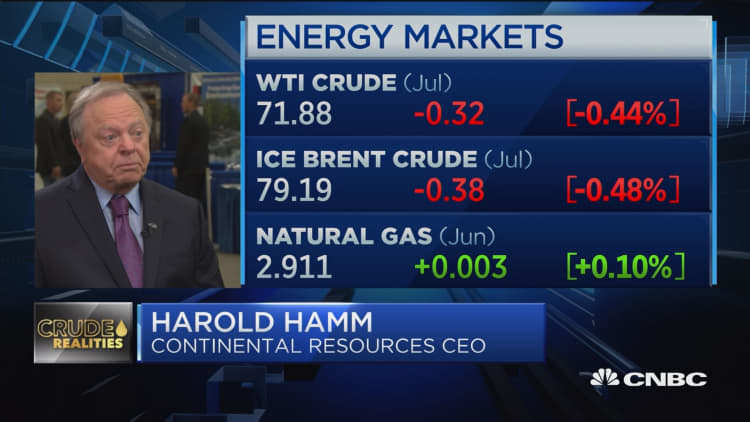Oil prices fell sank on Thursday, with expectations building that OPEC could wind down the output deal in place since the start of 2017 due to supply concerns out of Venezuela and Iran.
A surprise build up in crude oil inventories in the United States also weighed on prices, driving the spread between Brent crude and U.S. West Texas Intermediate (WTI) close to its widest in three years.
WTI crude futures ended Thursday's session down $1.13, or 1.6 percent, at $70.71 a barrel. International benchmark Brent futures were down 93 cents, or 1.2 percent, at $78.87 per barrel by 2:24 p.m. ET.
The Organization of Petroleum Exporting Countries may decide in June to lift output to make up for reduced supply from Iran and Venezuela and in response to concerns from Washington about a rally in oil prices, OPEC and oil industry sources told Reuters.

Russian Energy Minister Alexander Novak said production cuts could be eased "softly" if OPEC and non-OPEC countries see the oil market balancing in June, the Interfax news agency reported.
Russia and Saudi Arabia have a common position on the future of the oil output cut deal, Novak told Interfax news agency, though he said the deal would stay in place for now. Russia's Lukoil said the deal should remain in place but needs to be altered.
"A move to put more oil on the market by Saudi Arabia and Russia would be very bearish for prices. The mere contemplation of it has hit oil prices this week," said John Kilduff, a partner at Again Capital LLC in New York.
Venezuela's output has fallen amid an economic crisis, while Iran's supply is threatened by U.S. sanctions. These factors have helped push Brent and WTI to multi-year highs, with Brent breaking through an $80 threshold last week for the first time since November 2014.
"The chat is still that OPEC will do something at its June meeting in reaction to the looming prospect of a fall in crude production and exports from both Iran and Venezuela as the year progresses," said Greg McKenna, chief market strategist at CFD and FX provider AxiTrader.
OPEC and some non-OPEC major oil producers are scheduled to meet in Vienna on June 22. The group previously agreed to curb their output by about 1.8 million barrels per day to boost oil prices and clear a supply glut.

Global inventories have been broadly falling. But commercial U.S. crude inventories rose by 5.8 million barrels in the week to May 18, beating analyst expectations for a drop of 1.6 million barrels, the Energy Information Administration (EIA) said on Wednesday.
Inventories of gasoline rose by 1.9 million barrels in the same week, just ahead of the Memorial Day holiday in the United States which typically marks the start of the summer driving season.
On Thursday, U.S. President Donald Trump called off a planned summit with North Korean leader Kim Jong Un over that nation's nuclear aims.
Trump's comments should be negative for oil prices, but the comments pushed the dollar index down, supporting crude futures, Commerzbank strategist Carsten Fritsch said.
A weaker dollar makes greenback-denominated commodities less expensive for holders of other currencies. The dollar fell more than 0.2 percent against a basket of currencies.

